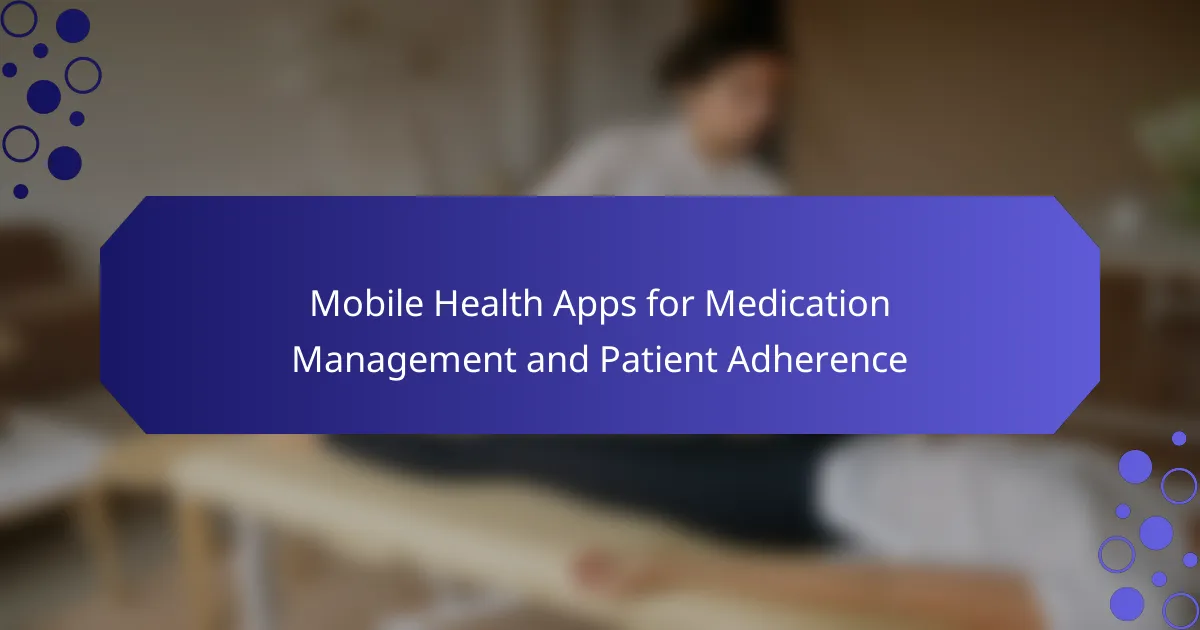Mobile health apps for medication management significantly improve patient adherence by providing essential features such as reminders, dosage tracking, and side effect monitoring. They integrate seamlessly with healthcare systems, enabling real-time data sharing and personalised care plans. Popular apps like Medisafe, MyTherapy, and Pill Reminder enhance user engagement through user-friendly interfaces and health insights. However, challenges such as cultural differences and technical literacy can impact their effectiveness, highlighting the need for inclusive design and innovative technologies.
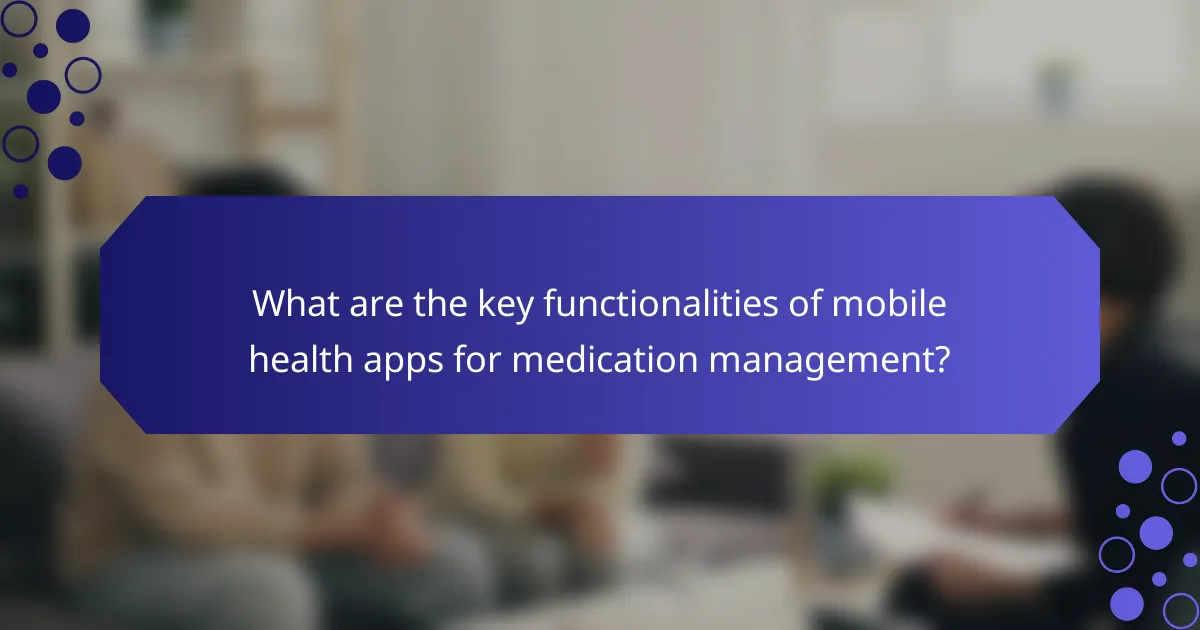
What are the key functionalities of mobile health apps for medication management?
Mobile health apps for medication management enhance patient adherence through several key functionalities. These apps provide medication reminders, track dosages, and monitor side effects. They often include features for prescription refills and educational resources about medications. Integration with health records allows for personalised care plans. Data analytics can identify adherence patterns, enabling healthcare providers to intervene effectively.
How do these apps enhance patient adherence to prescribed regimens?
Mobile health apps enhance patient adherence by providing reminders, tracking medication intake, and facilitating communication with healthcare providers. These features help patients stay organised and accountable for their prescribed regimens.
Apps often include customisable notifications, which can significantly improve adherence rates. For instance, studies show that reminders can increase medication compliance by over 30%.
Additionally, many apps offer educational resources about medications, empowering patients with knowledge about their treatment. This unique attribute fosters a sense of ownership in their health journey.
Finally, some apps allow for direct messaging with healthcare professionals, providing immediate support and clarification, which can further enhance adherence.
Which features are essential for effective medication reminders?
Essential features for effective medication reminders include user-friendly interfaces, customisable notifications, medication tracking, adherence analytics, and integration with health records. These attributes enhance user engagement and improve adherence rates. For instance, customisable notifications allow users to set reminders that fit their schedules, ensuring timely medication intake.
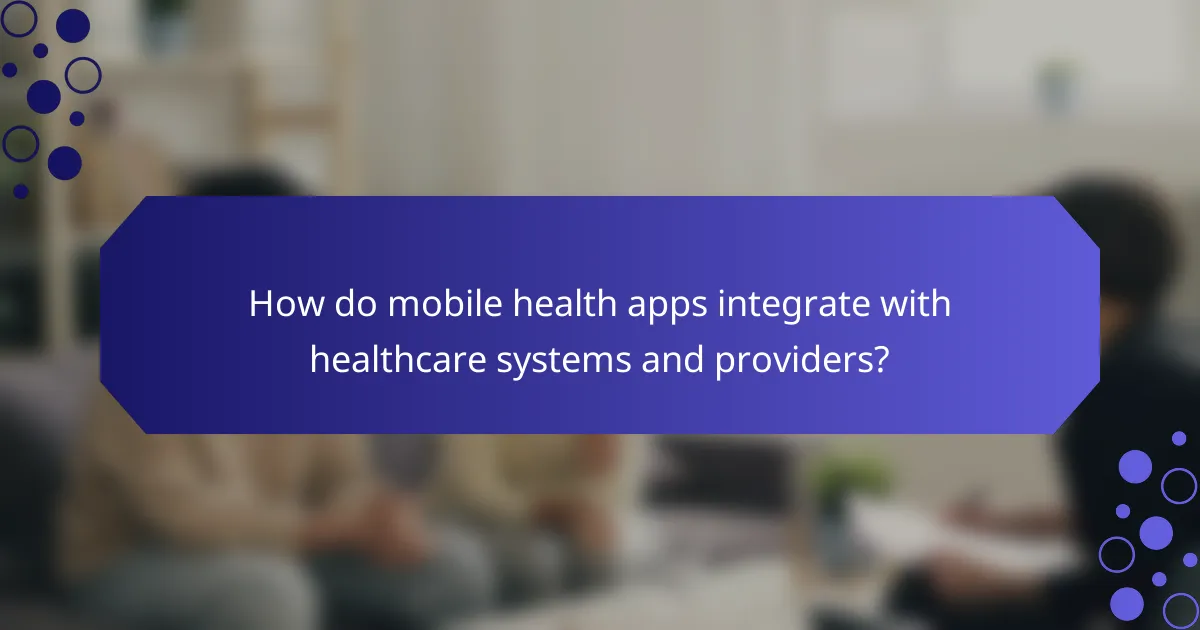
How do mobile health apps integrate with healthcare systems and providers?
Mobile health apps integrate with healthcare systems and providers by enabling real-time data sharing and communication. These apps enhance medication management and patient adherence through features like reminders, tracking, and direct messaging with healthcare professionals.
Integration allows for seamless updates of patient records, ensuring that providers have access to the latest medication information. For example, apps can automatically send adherence data to providers, facilitating timely interventions.
The use of standardised APIs ensures compatibility between mobile health apps and electronic health records. This fosters a unified approach to patient care, improving outcomes and reducing medication errors.
As a result, mobile health apps play a crucial role in bridging the gap between patients and healthcare systems, promoting better health management and adherence.
What role do electronic health records play in medication management apps?
Electronic health records (EHRs) enhance medication management apps by providing accurate patient data. They enable real-time access to medication histories, allergies, and potential drug interactions. This integration improves patient adherence and supports personalised medication plans. Additionally, EHRs facilitate communication between healthcare providers and patients, ensuring timely updates and reminders. As a result, medication management becomes more efficient and effective, ultimately leading to better health outcomes.
How can apps facilitate communication between patients and healthcare professionals?
Mobile health apps enhance communication between patients and healthcare professionals by providing real-time messaging, medication reminders, and access to health records. These features foster timely interactions and improve patient adherence. For example, apps can send alerts for medication schedules, reducing missed doses and ensuring better health outcomes. Additionally, secure messaging allows patients to ask questions and receive guidance without needing in-person visits, increasing convenience and engagement.
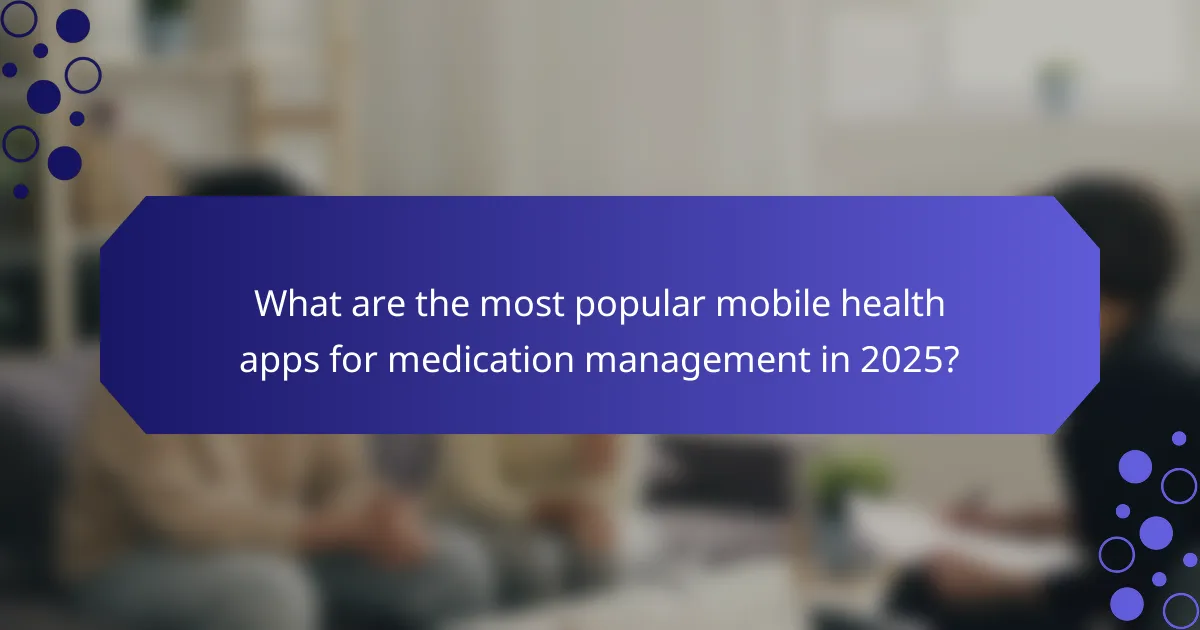
What are the most popular mobile health apps for medication management in 2025?
The most popular mobile health apps for medication management in 2025 include Medisafe, MyTherapy, and Pill Reminder. These apps enhance patient adherence through features like medication tracking, reminders, and health insights. Medisafe offers personalised reminders and a user-friendly interface, while MyTherapy includes health tracking and reports for healthcare providers. Pill Reminder focuses on simplicity and ease of use, ensuring users remain compliant with their medication schedules.
How do user reviews influence the selection of these apps?
User reviews significantly influence the selection of mobile health apps for medication management and patient adherence. Positive reviews build trust and credibility, leading to increased downloads and user engagement.
Users often prioritise features highlighted in reviews, such as user-friendliness, effectiveness, and customer support. High ratings can improve app visibility in app stores, making them more likely to be chosen by potential users.
Conversely, negative reviews can deter users, emphasising the importance of maintaining a good reputation. Apps that consistently receive constructive feedback can adapt and improve, enhancing their value to users.
Overall, user reviews serve as a critical factor in decision-making, impacting both user experience and app success in the competitive health app market.
Which apps are specifically designed for chronic disease management?
Several mobile health apps are specifically designed for chronic disease management. These apps focus on medication management and improving patient adherence. Examples include MyTherapy, Medisafe, and CareZone, which offer features like medication reminders, health tracking, and educational resources. These tools enhance patient engagement and support effective disease management.
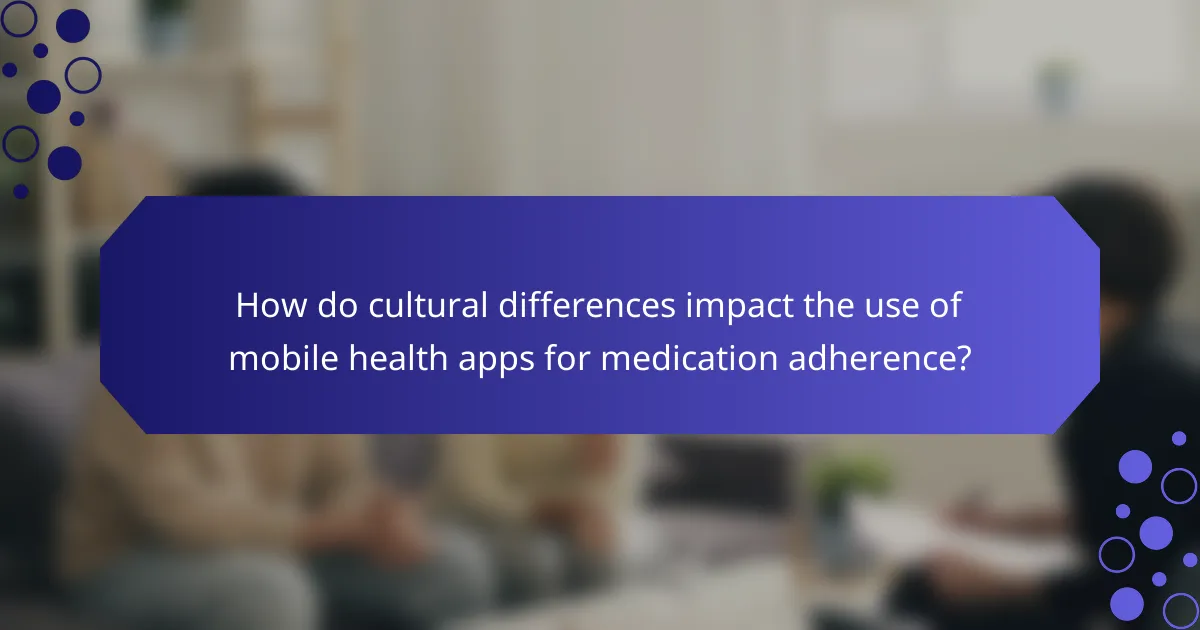
How do cultural differences impact the use of mobile health apps for medication adherence?
Cultural differences significantly influence the effectiveness of mobile health apps for medication adherence. Variations in health beliefs, communication styles, and technology acceptance can affect user engagement and adherence rates.
For instance, in collectivist cultures, community support may enhance adherence through shared responsibility, while individualistic cultures may prioritise personal accountability. Language barriers can also hinder app usability, impacting the effectiveness of reminders and educational content.
Additionally, cultural attitudes towards technology can dictate how readily individuals adopt these apps. In societies where technology is embraced, users may be more likely to engage with mobile health solutions, leading to improved medication adherence.
Understanding these cultural nuances is crucial for developers aiming to create effective and inclusive mobile health applications that cater to diverse populations.
What regional preferences exist in app features and functionalities?
Regional preferences in app features and functionalities vary significantly, reflecting cultural, technological, and healthcare system differences. For instance, North American users prioritise medication reminders and integration with wearables, while European users often seek comprehensive health records and telehealth options. In Asia, social sharing features for medication adherence are more prevalent, emphasising community support. Local regulations also influence functionalities, with some regions requiring data privacy features. Customisation to local languages and health practices enhances user engagement and satisfaction.
How do user demographics influence app adoption rates?
User demographics significantly affect app adoption rates for mobile health apps focused on medication management and patient adherence. Factors such as age, income, and education level influence user engagement and technology acceptance.
Younger users tend to adopt mobile health apps more readily due to familiarity with technology. In contrast, older populations may face barriers related to usability and trust in digital solutions. A survey found that 70% of users aged 18-34 regularly use health apps, while only 30% of users aged 55 and older do so.
Income levels also play a crucial role. Higher-income individuals are more likely to invest in premium health apps, which often offer advanced features for medication management. Conversely, lower-income groups may prefer free versions, limiting their access to comprehensive functionalities.
Education level impacts understanding and utilisation of mobile health apps. Users with higher education are more inclined to engage with features that promote patient adherence, such as reminders and tracking tools. This demographic may also be more proactive in managing their health, leading to increased app adoption.
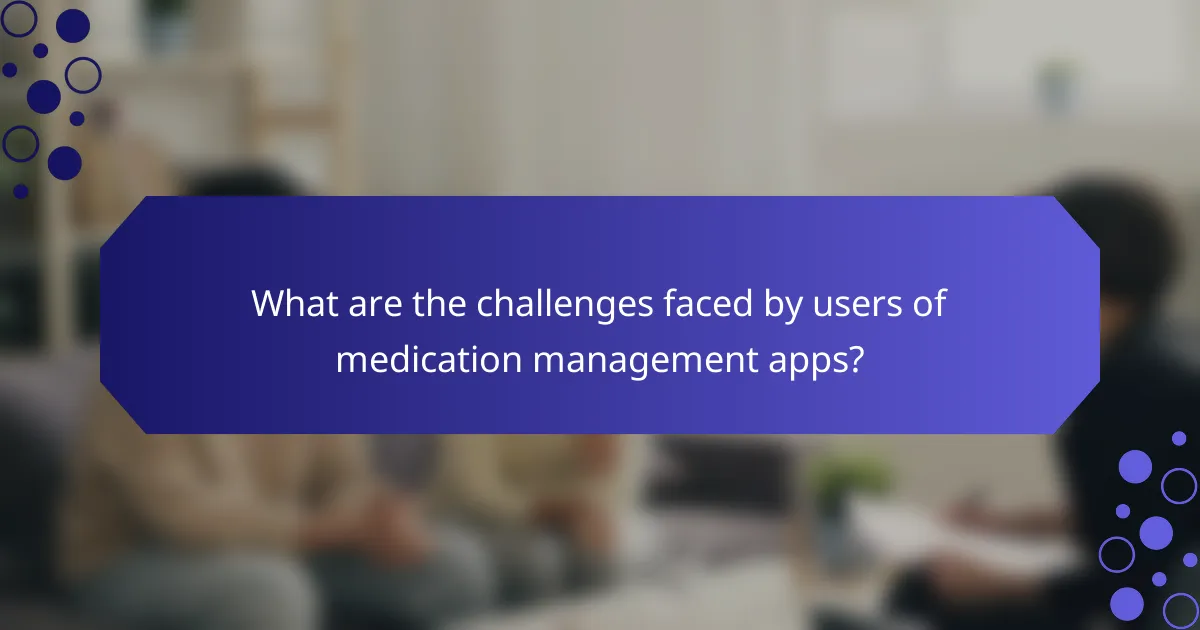
What are the challenges faced by users of medication management apps?
Users of medication management apps face several challenges that impact their effectiveness. Common issues include poor user interface design, which can lead to confusion and frustration. Additionally, data privacy concerns can deter users from fully engaging with the app. Users may also struggle with inconsistent reminders, resulting in missed doses. Other challenges include limited integration with healthcare providers and varying levels of technical literacy among users, which can hinder the app’s overall utility. Finally, the lack of personalised features may reduce user adherence to medication regimens.
How do technical issues affect user experience and adherence?
Technical issues negatively impact user experience and adherence in mobile health apps by causing frustration and reducing engagement. Frequent crashes or slow performance lead to user abandonment. Inconsistent notifications may result in missed medication doses. A study found that 30% of users discontinue apps due to technical difficulties. Moreover, lack of user-friendly interfaces can hinder navigation, making it challenging for patients to track their medication schedules effectively. Addressing these technical issues is crucial for enhancing user satisfaction and promoting adherence to treatment plans.
What privacy concerns exist regarding patient data in these apps?
Mobile health apps for medication management raise significant privacy concerns regarding patient data. Key issues include data breaches, unauthorised access, and inadequate data protection measures.
Many apps collect sensitive information, which can be vulnerable to hacking. For instance, a study found that 80% of health apps lacked adequate security features, exposing user data to risks. Additionally, unclear privacy policies can mislead users about how their data is used and shared.
Patients may also face risks if their data is shared with third parties without consent, leading to misuse. As a result, it is crucial for users to choose apps that prioritise data security and transparency.
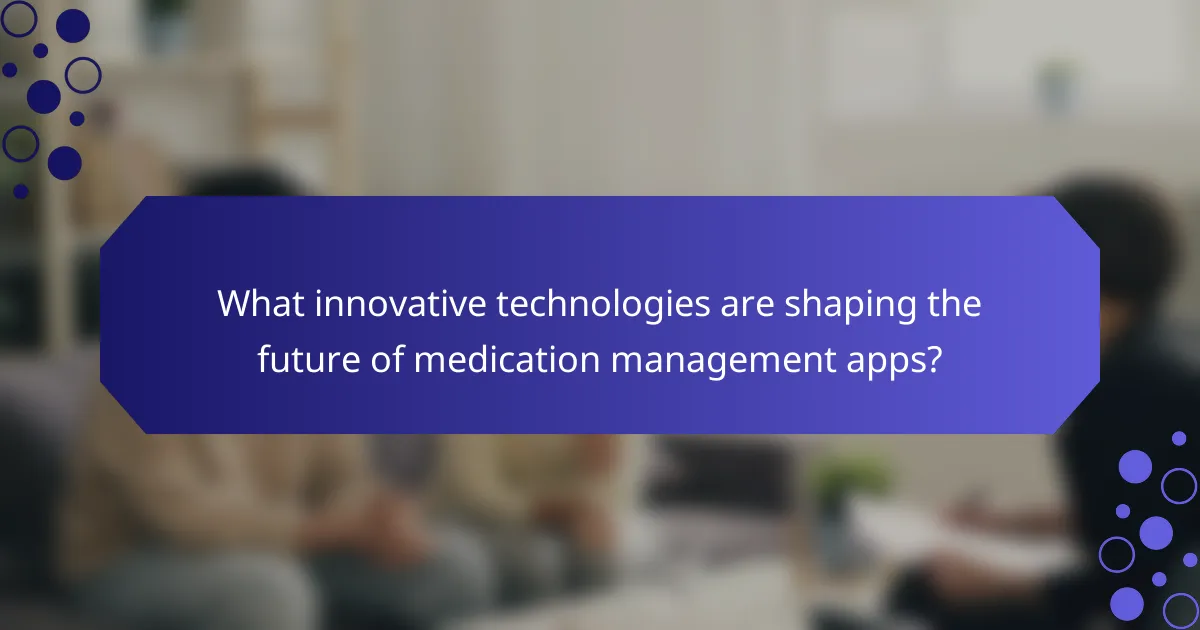
What innovative technologies are shaping the future of medication management apps?
Innovative technologies shaping medication management apps include AI, blockchain, and IoT. AI enhances personalised medication reminders and adherence tracking. Blockchain secures patient data and ensures transparency in prescriptions. IoT devices monitor health metrics in real-time, improving patient engagement and outcomes. These advancements streamline medication management, making it safer and more efficient.
How does artificial intelligence improve patient adherence tracking?
Artificial intelligence enhances patient adherence tracking through personalised reminders, real-time data analysis, and predictive analytics. These features enable mobile health apps to tailor medication schedules to individual needs, improving adherence rates. AI algorithms analyse patient behaviour, identify potential adherence issues, and suggest interventions. This proactive approach fosters better health outcomes and reduces hospitalisations. Additionally, AI can integrate with wearable devices, providing continuous monitoring and feedback to patients, further supporting adherence.
What role does telehealth play in enhancing app functionalities?
Telehealth enhances mobile health app functionalities by improving communication, accessibility, and personalised care. It allows real-time consultations, medication adjustments, and adherence tracking. This integration fosters patient engagement and supports better health outcomes. For instance, apps can send reminders for medication and facilitate virtual check-ins with healthcare providers, ensuring patients remain accountable and informed.
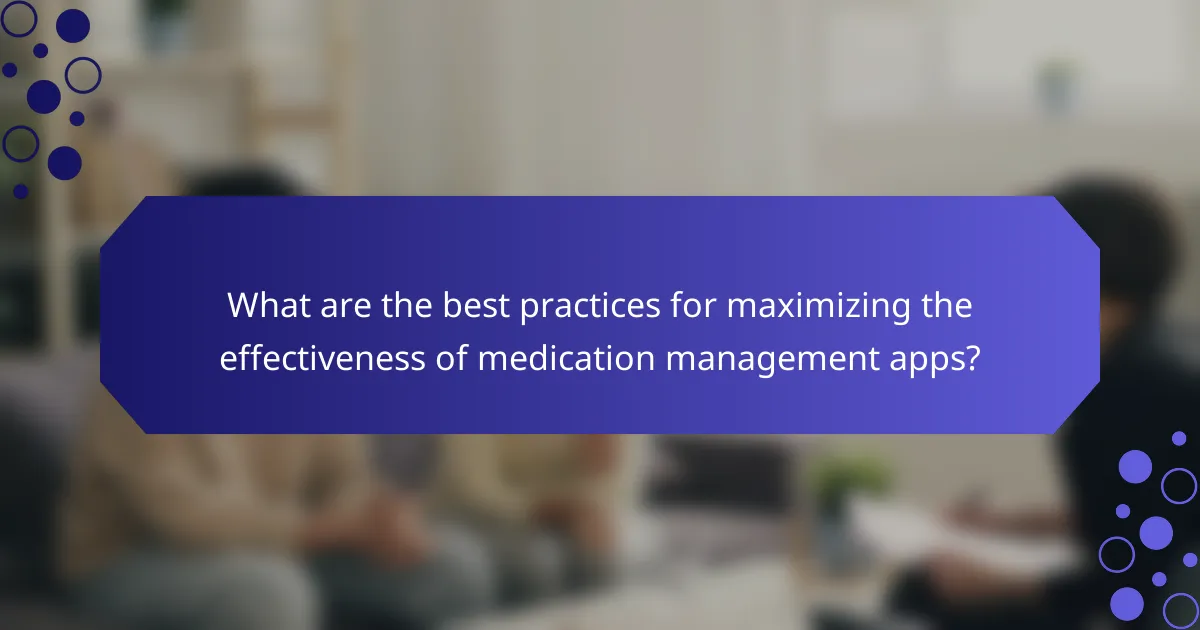
What are the best practices for maximizing the effectiveness of medication management apps?
To maximize the effectiveness of medication management apps, users should prioritise features that enhance adherence and usability. Key practices include setting personalised reminders, tracking medication intake, and utilising integrated health data.
1. Choose apps with customisable notifications to suit individual schedules.
2. Ensure the app allows for easy logging of medication intake.
3. Look for features that provide educational resources about medications.
4. Select apps that enable sharing of information with healthcare providers.
5. Utilise apps with a user-friendly interface to promote regular use.
How can users customize app settings for optimal results?
Users can customise app settings by adjusting notifications, reminders, and user interface preferences. These adjustments enhance medication adherence and overall user experience.
1. Set medication reminders to receive alerts at specific times.
2. Adjust notification preferences for daily or weekly summaries.
3. Customise the app interface for easier navigation.
4. Enable or disable features based on personal health needs.
5. Sync with wearable devices for real-time health tracking.
6. Review and update personal health information regularly for accurate feedback.
What common mistakes should users avoid when using these apps?
Users should avoid common mistakes like neglecting app notifications, failing to update medication lists, and not utilising reminders. These oversights can hinder medication adherence and effective management.
1. Ignoring notifications can lead to missed doses.
2. Not updating medication lists may result in incorrect information.
3. Failing to set reminders can disrupt adherence schedules.
4. Overlooking app features limits the potential benefits of the app.
5. Not reviewing medication interactions can pose health risks.
6. Avoiding regular app usage diminishes its effectiveness.
